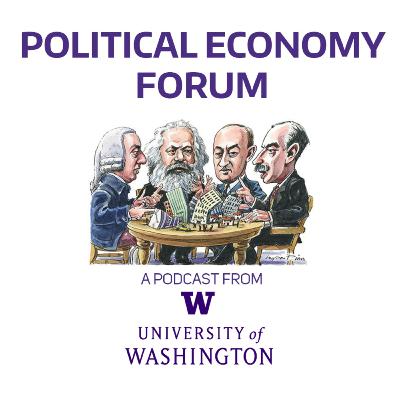Discover Political Economy Forum
Political Economy Forum

92 Episodes
Reverse
In this episode, Prof. James Long speaks to Prof. Wendy Wong of the University of British Columbia about her new book: "We, the Data: Human Rights in the Digital Age".
In this episode, Feler Bose of Indiana University East School of Business and Economics speaks about the regulation of sexual practices in the US.
In this episode, Prof. Jorge Rojas-Vallejos of Universidad Andres Bello in Chile discusses ongoing political reforms in Chile.
In this episode, former CIA Media analyst and author Martin Gurri describes how digital technologies have maybe irreversibly changed the information landscape, with profound implications for governance.
In this episode, Nick De La Forge describes the approach and practice of German Venture Fund Planet A Ventures, of which Nick is a co-founder.
In this episode, Boaz Miller of Zefat Academic College discusses to what extent technologies have values embedded in them and what political insights can be gleaned from that.
In this episode, Prof. Daniel Bessner of the University of Washington discusses his 2018 book "Democracy in Exile", describing the crucial impact that social scientists had in reshaping political institutions during the early Cold War period. This is a fascinating history of the creation of the US think tank ecosystem, the sidelining of majoritarian institutions in an era of crisis, and the origin of foundational ideas in a variety of academic fields.
In this episode, Prof. Joan Williams of the University of California, Hastings, speaks about her new initiative: The Diploma Divide, arguing that Americans must grapple with the realities of economic class differences and their political impacts.
In this episode, Victor Menaldo and Nicolas Wittstock discuss the 1992 book "Technopoly - The Surrender of Culture to Technology" by Neil Postman.
In this episode, Herman Mark Schwartz of the University of Virginia discusses why the US Dollar has remained the central world currency despite the fact that the US is persistently running current account deficits
In this episode, UW undergraduate students Bella Wright, Asher Goldstein, and Weston Beckmann speak to host Nicolas Wittstock about the current state of US labor unions, recent efforts to unionize at Starbucks and Amazon, as well as applications of game theory in these contexts.
In this episode, Prof. Brett Christophers of Uppsala University speaks to host Nicolas Wittstock about the difficulties of obtaining financing for clean energy projects despite recent cost reductions of renewables.
In this episode, host Nicolas Wittstock speaks to Rachel Castellano and Ryan Goehrung, both PhD Candidates in the Political Science Dept. at the University of Washington, about their work on Human Trafficking in the US. In a recent paper, Rachel and Ryan explore the T-Visa program, intended to offer survivors of human trafficking a form of legal relief.
US Department of Labor list of goods produced with forced labor: https://www.dol.gov/agencies/ilab/reports/child-labor/list-of-goods
In this episode, Morgan Wack speaks to Prof. Chris Blattman of the Harris School of Public Policy at the University of Chicago, discussing the roots of war and paths to peace, which Blattman writes about in his recent book: "Why We Fight".
In this episode, Prof. Mark Schwartz of UVA discusses the cause of reductions in US economic growth since 1970, arguing that industrial organization plays a key role.
In this episode, Prof. Margaret O'Mara of the University of Washington discusses the origins and workings of the US Tech industry - in reference to her 2019 book: The Code - Silicon Valley and the Remaking of America.
In this episode, Prof. Judith Shapiro of American University and Prof. Yifei Li of NYU Shanghai discuss their book "China Goes Green: Coercive Environmentalism for a Troubled Planet?". Here, the authors discuss the varied impact of environmental policies under authoritarian government - and seek to evaluate the prospect of and rationale behind China's ambition to become an "ecological civilization".
In this episode, Prof. Vincent Geloso of George Mason University discusses historical US income inequality, the "U-Curve", and whether our thinking about income inequality should be reconsidered in the face of new evidence.
In this Episode, Prof. Daniel Greene of the University of Maryland speaks about his book "The Promise of Access", which evaluates the attraction of simple technological fixes to complicated social problems like poverty in the United States.
In this episode, Prof. Jan Eeckhout of the University of Barcelona Pompeu Fabra, speaks about his most recent book: "The Profit Paradox - How Thriving Firms Threaten the Future of Work."






